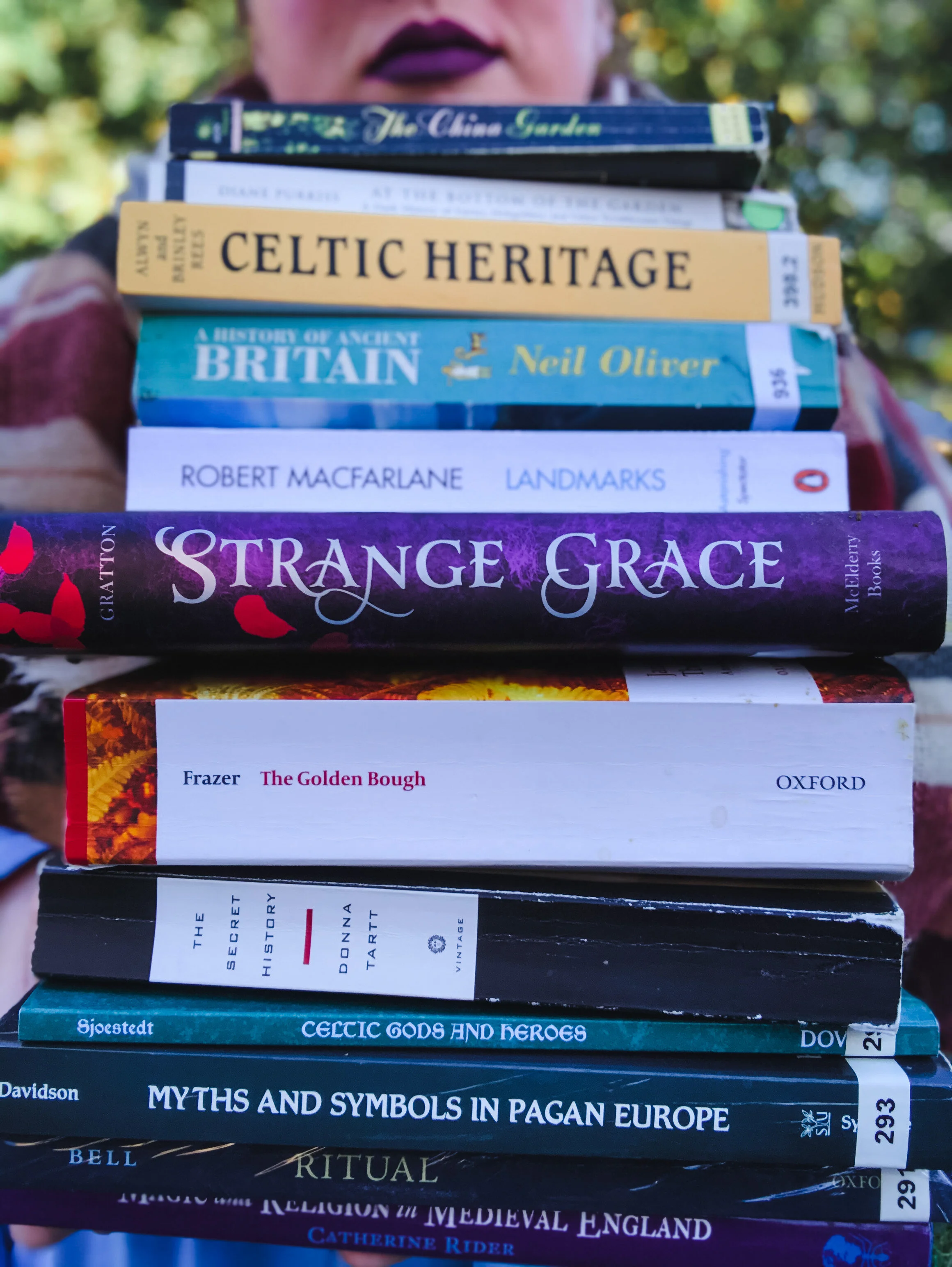There is a recursive relationship between research and inspiration.
I find that the two feed off each other in a way that's hard to quantify--usually inspiration sparks the first round of research, but then the research sparks a new wave of inspiration, and so on and so forth, until it's really hard to answer questions like 𝘸𝘩𝘦𝘳𝘦 𝘥𝘰 𝘺𝘰𝘶 𝘨𝘦𝘵 𝘺𝘰𝘶𝘳 𝘪𝘥𝘦𝘢𝘴? because the answer is a complicated snarl of: 𝘸𝘦𝘭𝘭 𝘐 𝘭𝘰𝘷𝘦𝘥 𝘵𝘩𝘪𝘴 𝘣𝘰𝘰𝘬 𝘸𝘩𝘦𝘯 𝘐 𝘸𝘢𝘴 𝘵𝘦𝘯 𝘢𝘯𝘥 𝘵𝘩𝘦𝘯 𝘐 𝘳𝘦𝘢𝘥 𝘢𝘯𝘰𝘵𝘩𝘦𝘳 𝘣𝘰𝘰𝘬 𝘵𝘩𝘢𝘵 𝘳𝘦𝘮𝘪𝘯𝘥𝘦𝘥 𝘮𝘦 𝘰𝘧 𝘩𝘰𝘸 𝘪𝘵 𝘧𝘦𝘭𝘵 𝘵𝘰 𝘭𝘰𝘷𝘦 𝘵𝘩𝘢𝘵 𝘧𝘪𝘳𝘴𝘵 𝘣𝘰𝘰𝘬 𝘴𝘰 𝘐 𝘥𝘦𝘤𝘪𝘥𝘦𝘥 𝘵𝘰 𝘸𝘳𝘪𝘵𝘦 𝘢𝘣𝘰𝘶𝘵 𝘢𝘯𝘤𝘪𝘦𝘯𝘵 𝘳𝘦𝘭𝘪𝘨𝘪𝘰𝘯 𝘢𝘯𝘥 𝘩𝘶𝘮𝘢𝘯 𝘴𝘢𝘤𝘳𝘪𝘧𝘪𝘤𝘦 𝘣𝘶𝘵 𝘮𝘢𝘬𝘪𝘯𝘨 𝘪𝘵 𝘩𝘰𝘳𝘯𝘺, 𝘣𝘶𝘵 𝘥𝘶𝘳𝘪𝘯𝘨 𝘮𝘺 𝘳𝘦𝘴𝘦𝘢𝘳𝘤𝘩 𝘐 𝘭𝘦𝘢𝘳𝘯𝘦𝘥 𝘹, 𝘺 𝘢𝘯𝘥 𝘻, 𝘸𝘩𝘪𝘤𝘩 𝘵𝘩𝘦𝘯 𝘨𝘢𝘷𝘦 𝘮𝘦 𝘢 𝘸𝘩𝘰𝘭𝘦 𝘯𝘦𝘸 𝘴𝘦𝘵 𝘰𝘧 𝘧𝘦𝘦𝘭𝘪𝘯𝘨𝘴, 𝘢𝘯𝘥 𝘵𝘩𝘦𝘯 𝘐 𝘳𝘦𝘢𝘥 𝘢 𝘣𝘰𝘰𝘬 𝘵𝘩𝘢𝘵 𝘮𝘢𝘥𝘦 𝘮𝘦 𝘧𝘦𝘦𝘭 𝘧𝘦𝘦𝘭𝘪𝘯𝘨𝘴 𝘢𝘣𝘰𝘶𝘵 𝘵𝘩𝘦 𝘯𝘦𝘸 𝘧𝘦𝘦𝘭𝘪𝘯𝘨𝘴 𝘐'𝘥 𝘩𝘢𝘥 𝘢𝘣𝘰𝘶𝘵 𝘵𝘩𝘦 𝘳𝘦𝘴𝘦𝘢𝘳𝘤𝘩, 𝘴𝘰 𝘐 𝘧𝘰𝘶𝘯𝘥 𝘥𝘪𝘧𝘧𝘦𝘳𝘦𝘯𝘵 𝘳𝘦𝘴𝘦𝘢𝘳𝘤𝘩 𝘢𝘣𝘰𝘶𝘵 𝘵𝘩𝘦 𝘯𝘦𝘸-𝘯𝘦𝘸 𝘧𝘦𝘦𝘭𝘪𝘯𝘨𝘴 and so on and so forth until right this very moment while I'm still researching as I finish up edits.
I understand the problem better now after taking Becca Syme’s Strengths For Writers course, when I learned that I have this lineup:
#1 Context
#2 Intellection
#3 Input
#4 Learner.
(And then connectedness, empathy, belief, developer, ideation, and strategic, for any Strengths Finder wonks out there.)
Basically what this means is that I can get carried away with research--especially for a series like Thornchapel where there's so much to learn, so much history to weave into the setting, and so many Feels and Themes to work in.
I've had a couple people ask if I've kept a list of what I've read for Thornchapel, and BOY HAVE I!!!!! The bibliography—as much as I’ve been able to gather—is below.
(Yes, those are Dewey Decimal numbers on some of the books. I try to Dewey all my non-fic [although I'm behind a year or two.])
(Lipstick is Covfefe by @lipslut)
Thornchapel Bibliography
Non-Fiction:
Armstrong, Karen. Short History of Myth. New York: Canongate Canons, 2018.
Aslan, Reza. God: a Human History. New York: Random House, 2018.
Bell, Catherine M. Ritual, Perspectives and Dimensions. Oxford: Oxford University Press, 2009.
Cunliffe, Barry W. Britain Begins. Oxford: Oxford University Press, 2013.
Davidson, Hilda Roderick Ellis. Myths and Symbols in Pagan Europe: Early Scandinavian and Celtic Religions. Syracuse: Syracuse Univ. Press, 2006.
Ellis, Peter Berresford. Celtic Myths and Legends. London: Constable & Robinson, 2008.
Fox, Kate. Watching the English: the Hidden Rules of English Behavior. Boston: Nicholas Brealey Publishing, 2014.
Frazer, James George., and Robert Fraser. The Golden Bough: a Study in Magic and Religion: a New Abridgement from the Second and Third Editions. Oxford: Oxford University Press, 2009.
Kaldera, Raven. Pagan Polyamory: Becoming a Tribe of Hearts. Woodbury, MN: Llewellyn, 2005.
Lyall, Sarah. The Anglo Files: a Field Guide to the British. New York, NY: W.W. Norton & Company, Inc., 2009.
Macfarlane, Robert. Landmarks. London: Penguin Books, 2016.
Mansell, Chris. Ancient British Rock Art: a Guide to Indigenous Stone Carvings. Glastonbury, Somerset: Wooden Books, 2007.
McCoy, Edain. Celtic Myth & Magick: Harness the Power of the Gods and Goddesses. St. Paul, MN, U.S.A.: Llewellyn Publications, 1998.
Mueller, Hans-Friedrich. “The Pagan World: Ancient Religions Before Christianity.” The Great Courses Series.
Newman, Hugh. Stone Circles. Glastonbury, U.K.: Wooden Books, 2018.
Newman, Phil. The Field Archaeology of Dartmoor. Swindon: English Heritage, 2011.
Oliver, Neil. A History of Ancient Britain. London: Phoenix, 2012.
Paxton, Jennifer. “The Celtic World.” The Great Courses Series.
Purkiss, Diane. At the Bottom of the Garden: a Dark History of Fairies, Hobgoblins, and Other Troublesome Things. New York: New York University Press, 2005.
RavenWolf, Silver. To Ride a Silver Broomstick: New Generation Witchcraft. Woodbury, MN: Llewellyn Publications, 2016.
Rees, Alwyn, and Brinley Rees. Celtic Heritage: Ancient Tradition in Ireland and Wales. London: Thames and Hudson, 1975.
Robb, Graham. The Discovery of Middle Earth: Mapping the Lost World of the Celts. New York: W.W. Norton & Company, 2015.
Rovelli, Carlo, Erica Segre, and Simon Carnell. The Order of Time. UK: Allen Lane, 2019.
Sjoestedt, Marie-Louise. Celtic Gods and Heroes. Mineola: Dover, 2000.
Voth, Grant. “Myth in Human History.” The Great Courses Series.
Fiction:
The China Garden by Liz Berry
House of Leaves by Mark Danielewski
Strange Grace by Tessa Gratton
Lammas Night by Katherine Kurtz
The King Must Die by Mary Renault
The Secret History by Donna Tartt
